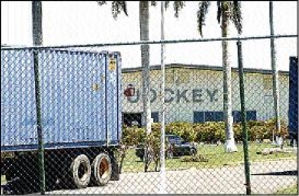
A section of the Jockey garment factory at the Haughton Industrial Estate in Lucea.- photo by Claudia Gardner
WESTERN BUREAU: SOME FORMER employees of the Jockey International Garment Factory at the Haughton Industrial Estate in Lucea who were made redundant last year are feeling the pinch of harsh economic realities.
At the same time, those still employed there are bracing for what lies ahead when the factory pulls out of Jamaica later this month after more than two decades in operation.
Earlier this year, Jockey International announced that the closure of the Lucea plant was linked to the shutdown of its Cooleemee facilities in North Carolina, USA, which supplies the Lucea plant with fabric.
world fell apart
Gloria Ambusley, 45, of First Hill in Lucea, said her world fell apart after she was made redundant last February when Jockey began scaling down its Lucea operations. She had worked at the company for 22 years, and at the time was employed as a sewing instructor.
"Jockey was my first full-time job and I gave it my all. When I lost my work, I had just started a constructing a new home," she said. "It was very shattering - The little money I got from the redundancy, I took that money and put it towards constructing my home."
Since then, Ambusley, who is the mother of a seven-year-old, has been operating a small snack stand at the entrance to the factory, as she says she possesses no other skill. She told The Sunday Gleaner she was still grateful.
Like Ambusley, twenty-five-year-old Kery Small of Bulls Bay in Lucea was ill-prepared for his redundancy which came unexpectedly.
He received $4,500 weekly from Jockey where he worked on several different sewing lines, including underwear and T-shirts.
"We heard sometime before that the factory was going to lock down and people were going to get redundant. They did not say who, but the factory started to get slow and they started to lay off people. I used to work on the tee-shirt line and that was one of the biggest lines in the factory, so when we heard people were going to get laid off, we wouldn't know it was us because that line was the newest," Small said.
"They sent me home for three weeks, called me back, gave me a job on the packaging line, then little after that they gave me a letter saying I get laid off and I should not come back to work."
Small said he has not gained any employment since, but has undergone hospitality training with the intention to enter the tourism transportation business.
In its heyday, the 56,000-square foot plant provided employment for close to 600 persons, mainly young women from Lucea and its environs. This number is particularly significant, as Lucea has a population of approximately 7,000 persons.
number one in quality
The factory's closure will up the parish's 30 per cent unemployment rate, which is way above the national average.
For more than two decades, Jockey was the main capital base of the town. It took over when agriculture declined. Jockey Lucea was rated number one worldwide in terms of quality and productivity for many years.
Its success led the company to acquire another plant at Sandy Bay near Tryall in Hanover. This factory, however, changed hands to Hanes Garment Factory in the 1990s.
In preparation for the impending challenges after the factory closes, some workers have started making preparations for the fallout by enrolling in a two-month hospitality training evening programme at the Hanover Educational Institute (HEI), which includes customer service, conversational Spanish and personal development.
requalify yourself
According to executive director of the HEI, Angela Haye, her organisation was approached by the human resources manager at Jockey to aid in preparing women from the plant to re-enter the job market.
"We are very happy to help them to requalify themselves because their background has been just Jockey," Haye said. "For most of the ladies, their positions at Jockey is the only job they have ever had, and others did not get the chance to finish high school, so some refining has to take place. They are doing well and are satisfied with the programme though," she added.
One of the enrolees in the HEI programme is Genodine Kerr, a 36-year-old mother of five of Sandy Bay in the parish.
"This work is my only source of income for the past 13 years and I don't have any idea as to what I am going to do because I don't really have any other options or have any subjects, and so it is going to be very hard trying to educate yourself and educate the kids and put food on the table, but we just have to cope," Kerr shared with The Sunday Gleaner. "But I am planning on doing some subjects with the little money they (Jockey) are going to pay me."
expensive
Kerr says she is hoping the Government will be able to get investors to take charge of the plant very soon.
In June, Minister of Industry and Investment, Karl Samuda, announced that exploratory talks were being held with an information technology company, but that converting the plant could be expensive. He also said that Jamaica Trade and Invest (JTI) was also in discussions with another local investor.
claudia.gardner@gleanerjm.com